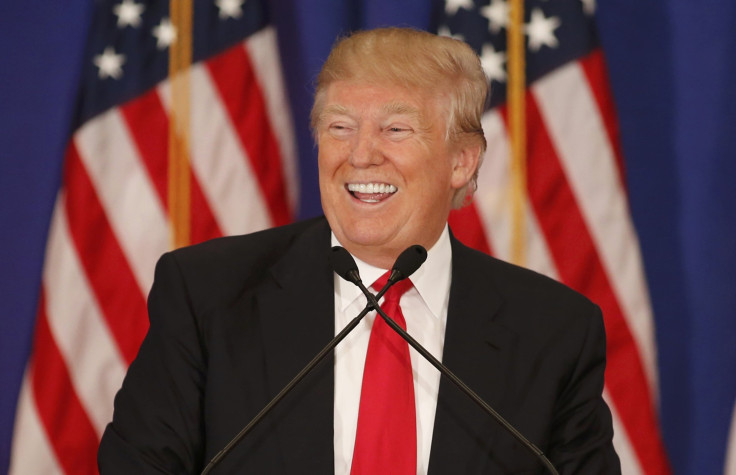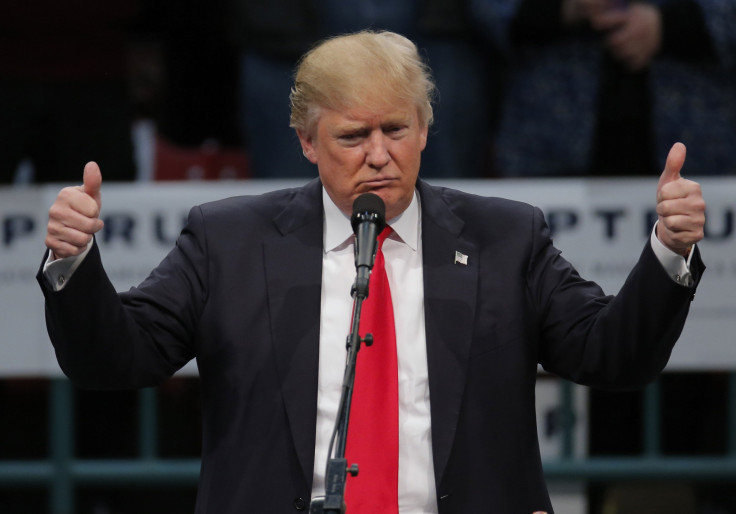Super Tuesday 2 Results: Will Donald Trump’s Wins Force Marco Rubio Out Of Republican Race?

Donald Trump succeeded in staving off his competition Tuesday, winning both Mississippi and Michigan — the two major states of the night — as he recovered from a rough week. Over the past few days, Trump faced a consolidating effort from the Republican establishment to stop his candidacy, saw himself attacked in the GOP debate on Thursday and barely pulled out wins over Texas Sen. Ted Cruz on Saturday.
Tuesday presented an important test for Trump, who has been leading the GOP field for most of the election cycle, but who had briefly showed signs of fading in recent days. As results were coming in Tuesday night, Trump beat his opponents by wide margins in Michigan and Mississippi, leaving Florida Sen. Marco Rubio with particularly disappointing performances. Shortly before midnight on Tuesday, Cruz was leading in Idaho and Hawaii results had not yet come in.
Trump criticized his opponents and defended himself against attacks from establishment Republicans like Mitt Romney, who have spoken out against him recently, during his victory speech Tuesday night in Florida.
“I don’t think I’ve ever had so many horrible, horrible things said about me in one week — $38 million worth of horrible lies, but that’s OK,” Trump said during a combination press conference and speech at one of his golf resorts. “It shows you how brilliant the public is, because they knew they were lies.”
Before Tuesday, the New York real estate mogul had slowed down from his sweeping victories on Super Tuesday, winning just two of four nominating contests on Saturday. By contrast, Cruz won a far greater share of the delegates Saturday than he had the week before, taking home more delegates than Trump over the weekend. Cruz has clearly benefited from the decline in popularity of Rubio, whose high point Saturday was earning 17 percent in the Kansas caucuses.
Though many establishment Republicans have hoped the party could coalesce around Rubio as a mainstream candidate, the Florida senator has won just two nominating contests so far and has failed to garner the majority of the non-Trump vote. Tuesday night proved another blow to the establishment favorite, as he garnered only single-digit support in Michigan and Mississippi, coming in far below the 15 percent threshold for delegates in those states.

The results for the Idaho primary and Hawaii caucus were not yet in Tuesday night, so Rubio could still pick up a few delegates there, but those states would not bring him up to speed with Cruz or Trump, who each hold a lead of more than 100 delegates over Rubio.
In a turn of events that underscored Rubio’s slipping popularity, a new national poll from NBC News/Wall Street Journal released Tuesday had Rubio in fourth place behind not only Trump and Cruz, but also Ohio Gov. John Kasich. The poll showed Rubio at 20 percent, Kasich at 22 percent and Cruz and Trump statistically tied for first. Cruz got 27 percent support in the poll and Trump got 30 percent support, but the difference was within the survey’s plus-or-minus 4.9 percent margin of error.
The surge was a burst of good news for Cruz ahead of Tuesday’s results. The Texas senator has been outspoken about wanting the other GOP candidates to drop out and unite behind him against Trump, and the front-runner also called specifically for Rubio to drop out of the race during his remarks on Saturday.
Word is I am doing very well in Michigan and Mississippi! Wow, and with all that money spent against me! Will be going to Trump Jupiter now!
— Donald J. Trump (@realDonaldTrump) March 8, 2016
Still, Cruz trailed Trump Tuesday, coming in second in Mississippi and practically tied with Kasich for second in Michigan. Trump hit Cruz during his remarks Tuesday evening, saying that the Texas senator would have a hard time in states like New York and New Jersey that hold primaries later in the season.
"I want to thank the public, I want to thank the people of Michigan, I want to thank the people of Mississippi," Trump said Tuesday. "To get these kind of numbers where they call them immediately is just very special."
The Republican front-runner also touted Trump Steaks, Trump Wine and other Trump products as he called out the Republican Party for going after him, and claiming credit for the high turnout GOP primaries have seen in 2016.
"Don't forget we have Democrats coming over, very importantly, we have independents coming over," Trump said. "With all of these people coming over it’s going to be special."
Though many pundits focused on Tuesday as a rough night for Rubio, it also represented a disappointing finish for Kasich. The Ohio governor, who was expected to do well in Michigan, came in third place there and trailed Trump by 10 percent. Before the primary there, he said that if he could do well in Michigan and win in his home state of Ohio next week, he would recover from his position at the bottom of the pack.
Kasich spoke to supporters Tuesday after the Michigan results came in, and declared he was proud of his showing. He also referred to "the three of us" competing in the remaining GOP primaries, excluding Rubio from his consideration.
“I’m going to continue to run a positive campaign,” Kasich said Tuesday. “I think the people are beginning to reward a positive campaign.”
The Ohio governor has largely avoided engaging in the kind of attacks that Trump and the other contenders have frequently resorted to on the campaign trail, and due to his low standing, has also escaped being the focus of attacks this election cycle. Kasich is more moderate than any of the other candidates in the race, and was polling in second place in Michigan before Tuesday night.
As for the other big prize Tuesday night, Mississippi's very white, conservative, religious Republican electorate should have been good for Cruz, but Trump's success there echoed his wins in other Southern states on Super Tuesday. Trump's ability to repeat that success was a sign the front-runner was as strong as ever.
After Tuesday, the next big round of voting will come on March 15 when delegate-rich Illinois, Florida, Ohio and North Carolina will hold their primaries. Both Rubio and Kasich have said they will definitely stay in the race until their home states vote next week, but it is unlikely Rubio will win Florida, and even if Kasich does win Ohio, he will still be far behind Trump and Cruz in the delegate count.
Those states could, however, continue to divide delegates and slow Trump’s progress toward the 1,237 he needs to win the GOP nomination outright. After Tuesday, the candidates will have a chance to face off in a debate on Thursday, which could let them capitalize on momentum or try to bounce back from Michigan and Mississippi ahead of the Florida and Ohio primaries. Those contests next week will mark a turning point in the campaign and may be the end for Rubio and Kasich if they cannot prove themselves viable standard-bearers for the "Never Trump" movement.
© Copyright IBTimes 2025. All rights reserved.






















